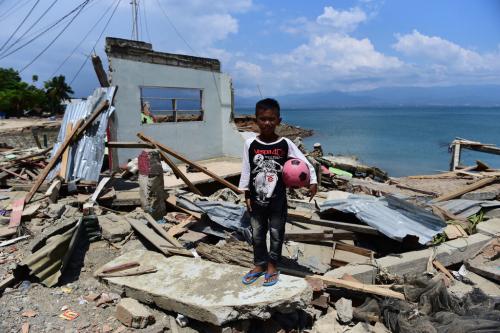Improve collection of data on disasters, Secretary-General Guterres urges on International Day
Highlighting the steep human and economic impact of disasters, United Nations Secretary-General António Guterres has called on countries to improve data collection on the catastrophes, including comprehensive accounting of economic losses, to advance progress on crisis prevention.

A ten-year-old child stands in front of his home, which was destroyed by the tsunami in Central Sulawesi.
In a message commemorating the International Day for Disaster Reduction – which this year fell shortly after the devastating earthquake and tsunami in Indonesia – Mr. Guterres said that measuring economic losses “can also motivate Governments to do more” to achieve the targets of the Sendai Framework for Disaster Risk Reduction.
“A better understanding of the economic losses from extreme weather events can help to generate greater action on climate change and increased ambition on reducing greenhouse gas emissions,” he said.
“Reducing the economic losses from disasters has the power to transform lives and contribute greatly to the eradication of poverty.”
Globally, millions are affected, lose their homes and livelihoods as a result of extreme weather events and natural disasters, while economic losses cost nations billions of dollars.
However in spite of the staggering impact, not all countries report systematically on the economic losses from major disaster events, according to a recent report by the UN Office for Disaster Risk Reduction (UNISDR).
Between 1998-2017, losses were recorded in only 53 per cent of disasters in high-income countries, while in low-income countries, the figure was a mere 13 per cent.
Improving data collection and analysis, can therefore, bring immense benefits to all countries in not only reducing economic losses, but also saving lives and livelihoods and managing disaster risk, said UNISDR.
This year, the International Day focuses on Target C of the Sendai Framework, reducing disaster economic losses in relation to global GDP by 2030. Agreed by UN Member States, in 2015, the Sendai Framework includes seven targets and four priorities for action to reduce disaster risk.
Held every 13 October, the International Day for Disaster Reduction celebrates how people and communities around the world are reducing their exposure to disasters and raising awareness about the importance of reining in the risks that they face.
Source:United Nations
- 314 reads
Human Rights
Ringing FOWPAL’s Peace Bell for the World:Nobel Peace Prize Laureates’ Visions and Actions

Protecting the World’s Cultural Diversity for a Sustainable Future

The Peace Bell Resonates at the 27th Eurasian Economic Summit

Declaration of World Day of the Power of Hope Endorsed by People in 158 Nations

Puppet Show I International Friendship Day 2020

